Main point up front: What do I need to do change to display the correct values for heads/tails in my records?
Edit 1: The arrays of integers inside the Record appear to fill with random values once there is more than 1 thread.
I've been trying to debug this for a few days now. My code is complete and fully executes. (Just so everyone knows, I'm a student and not pretending to be a professional programmer.)
In my multi-threaded coin toss program, I'm trying to capture the amount of times heads or tails occurs in each thread. I'm flipping a coin a total of 100,000,000 times. (One-hundred million.)
The elements in the arrays inside my record class are not accumulating correctly. I know I don't need to use mutex locks, because each thread is accessing a separate memory location unique to the thread. But the threads are updating the values incorrectly, which shouldn't be happening.
Here are examples from my debug.
- Single thread (notice the correct amount of heads/tails):
- Two threads (now heads/tails count just goes crazy.):
Fully executable code sample is below, followed by sample output. Also, here is link to full code on Github as well:
#include <iostream>
#include <thread>
#include <vector>
#include <mutex>
#include <random>
#include <algorithm>
#include <time.h>
#include <strstream>
#include <random>
using namespace std;
default_random_engine dre;
uniform_int_distribution<int> Tosser(0,1);
struct Record {
Record();
~Record();
int numThreads;
int *heads;
int *tails;
time_t startTime;
time_t stopTime;
time_t duration;
int timesToToss;
};
Record::Record(): numThreads(0), heads(NULL), tails(NULL), startTime(NULL), stopTime(NULL), timesToToss(0){}
Record::~Record() {
startTime = NULL;
stopTime = NULL;
duration = NULL;
timesToToss = NULL;
delete [] heads;
heads = NULL;
delete [] tails;
tails = NULL;
numThreads = NULL;
}
void concurrency(){
vector<thread> threads;
Record *records = new Record[4];
Record *recPtr;
int *numThrPtr;
int *headsPtr;
int *tailsPtr;
time_t *startTimePtr;
time_t *stopTimePtr;
vector<time_t> durations;
int timesToToss = 100000000; // Times to flip the coin.
int index = 0; // Controls which record is being accessed.
for(int i=1;i<3;i*=2){ //Performs 2 loops. 'i' is calculated to represent the number of threads for each test: 1, and 2 (full code contains up to 8 threads.)
recPtr = &records[index]; //Get the address of the next record in the Record array.
recPtr->timesToToss = timesToToss; //
recPtr->numThreads = i; //Record the quantity of threads.
recPtr->heads = new int[recPtr->numThreads]; //Create a new heads array, of 'x' elements, determined by number of threads.
recPtr->tails = new int[recPtr->numThreads]; //Create a new tails array, of 'x' elements, determined by number of threads.
recPtr->startTime = time(0); //Record the start time.
for(int j = 0;j<recPtr->numThreads;j++){ //Start multi-threading.
headsPtr = &recPtr->heads[j]; // Get the address of the index of the array, one element for each thread for heads.
tailsPtr = &recPtr->tails[j]; // Get the address of the index of the array, one element for each thread for heads.
threads.push_back(thread([&headsPtr, &tailsPtr, timesToToss](){for(int k=0;k<timesToToss;k++){ if (Tosser(dre)) ++(*headsPtr); else ++(*tailsPtr); } })); //Toss a coin!
}
for(auto& thread: threads) thread.join(); // Collect/join all the threads.
while(!threads.empty()){ //Don't want to try and join 'live' threads with 'dead' ones!
threads.pop_back();//Clear out the threads array to start with an empty array the next iteration.
}
recPtr->stopTime = time(0); //Record the end time.
recPtr->duration = recPtr->stopTime - recPtr->startTime;
timesToToss /= 2; //Recalculate timesToToss.
++index; //Increase the index.
}
for (int i=0;i<4;i++){ //Display the records.
recPtr = &records[i];
cout << "\nRecord #" << i+1 << ", " << recPtr->numThreads << " threads.";
cout << "\nStart time: " << recPtr->startTime;
cout << "\nStop time: " << recPtr->stopTime;
cout << "\nTossed " << recPtr->timesToToss << " times (each thread).";
cout << "\nHeads appeared << " << recPtr->heads << " times.";
cout << "\nTails appeared << " << recPtr->tails << " times.";
cout << "\nIt took " << recPtr->duration << " seconds.";
durations.push_back(recPtr->duration);
cout << "\n" << endl;
}
sort(durations.begin(),durations.end());
cout << "Shortest duration: " << durations[0] << " seconds." << endl;
delete [] records;
records = NULL;
}
int main() {
concurrency();
return 0;
}
Output for recored #2 is[updated 5/5/2016 @ 2:16pm CST]:
Record #2, 2 threads.
Start time: 1462472702
Stop time: 1462472709
Tossed 50000000 times (each thread).
Heads appeared << 474443746 times.
Tails appeared << -1829315114 times.
It took 7 seconds.
Shortest duration: 3 seconds.
Process finished with exit code 0

